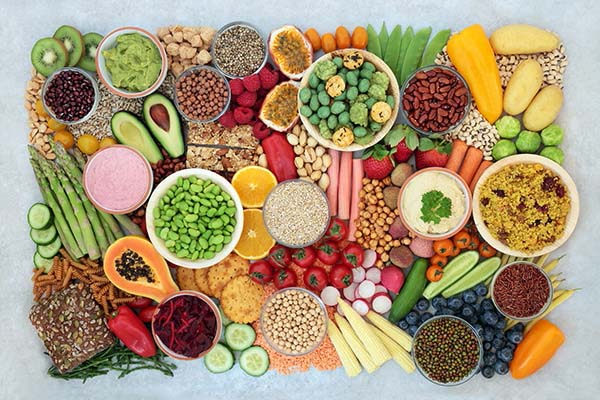What Athletes Say About Recovering on a Plant Based Beef Diet
What Athletes Say About Recovering on a Plant Based Beef Diet
Blog Article
All About Healthy Food: Benefits of Embracing Plant Based Alternatives
The conversation bordering plant-based diet plans has acquired considerable attention in the last few years. Several people are discovering the prospective health benefits, dietary benefits, and environmental impacts associated with these nutritional options. As people come to be much more knowledgeable about their food's influence on health and sustainability, concerns develop regarding the usefulness of embracing such a way of living. What details adjustments can one anticipate, and exactly how might these choices improve not only personal wellness but also the world's future?
Comprehending Plant-Based Diet Regimens
Although several people associate plant-based diet plans mainly with vegetarianism or veganism, these diet regimens can include a wide variety of eating patterns that focus on whole, minimally refined plant foods. Such diet regimens commonly include fruits, vegetables, entire grains, seeds, vegetables, and nuts, while eliminating or restricting pet products. This adaptability allows people to customize their dietary options according to nutritional needs and personal preferences. Some might adopt a mainly plant-based diet regimen while still occasionally consuming meat or dairy products, often described as a flexitarian technique. The emphasis remains on integrating more plant foods, which can lead to a diverse array of flavors and dishes. Recognizing these different analyses of plant-based eating is crucial for valuing its availability and allure in modern food culture.
Health And Wellness Conveniences of Plant-Based Foods
The health and wellness advantages of plant-based foods are considerable, supplying a nutrient density advantage that sustains overall health. Research study indicates that these foods can boost heart health and play a necessary role in reliable weight management. By including much more plant-based alternatives, people might boost their dietary selections and promote lasting health.
Nutrient Thickness Benefit
Nutrient thickness plays a vital duty in the health advantages of plant-based foods, making them a compelling option for those looking for a well balanced diet regimen. Plant-based foods, such as fruits, veggies, beans, nuts, and whole grains, are frequently rich in necessary vitamins, minerals, and antioxidants while being lower in calories. This high nutrient density permits individuals to eat less calories while still satisfying their nutritional needs. In addition, these foods are loaded with nutritional fiber, advertising digestive wellness and aiding in weight monitoring. By incorporating nutrient-dense plant-based options, customers can enhance their general health and wellness, sustain their body immune systems, and lower the threat of chronic illness. Eventually, the nutrient density of plant-based foods emphasizes their importance in a health-conscious way of living.
Heart Health And Wellness Enhancement

Weight Management Assistance
Along with advertising heart health, a plant-based diet regimen can substantially help in weight management. This nutritional method emphasizes whole foods such as fruits, veggies, legumes, nuts, and entire grains, which are normally reduced in calories and greater in fiber compared to animal-based items. The high fiber material assists boost satiety, lowering general calorie intake. In addition, plant-based diet plans are commonly abundant in crucial nutrients while reduced in unhealthy fats, making it much easier to maintain a healthy and balanced weight. BBQ Sauces. Study shows that people who adopt a plant-based way of living have a tendency to have reduced body mass indexes (BMIs) and experience even more effective weight reduction contrasted to those that consume meat-heavy diets. Accepting plant-based options is a calculated selection for reliable weight administration.
Nutritional Value of Plant-Based Active Ingredients
Plant-based ingredients are rich in necessary nutrients, using a diverse variety of vitamins, minerals, and anti-oxidants that contribute to general wellness. A contrast of healthy protein sources discloses that while animal items are frequently deemed exceptional, numerous plant-based options provide ample protein and various other beneficial substances. Understanding the nutritional value of these components can aid people make informed nutritional choices.
Important Nutrients in Plants
Nutrient-rich ingredients located in plants use a diverse range of crucial vitamins and minerals that add greatly to general health and wellness. These ingredients are abundant in vitamins A, C, and K, which support immune feature, vision, and blood clotting, specifically. In enhancement, plants offer vital minerals such as potassium, calcium, and magnesium, vital for heart wellness, muscle feature, and bone toughness. The presence of fiber in plant-based foods aids food digestion and promotes a healthy and balanced intestine microbiome. Anti-oxidants, found abundantly in vegetables and fruits, assistance combat oxidative anxiety and reduce swelling. Many plant foods are reduced in calories yet high in nutrients, making them an exceptional selection for those seeking to preserve a healthy weight while ensuring perfect nutrient consumption.

Contrasting Protein Sources
Protein sources differ substantially in their nutritional accounts, with plant-based active ingredients using unique advantages. Unlike pet healthy proteins, which commonly contain hydrogenated fats and cholesterol, plant proteins often tend to be reduced in these harmful parts. Legumes, nuts, seeds, and whole grains are abundant in essential amino acids, fiber, vitamins, and minerals. For example, lentils offer high healthy protein content alongside significant iron and folate, while quinoa is a full healthy protein, supplying all 9 crucial amino acids. Additionally, plant-based proteins are typically accompanied by anti-oxidants and phytochemicals that sustain overall health. The change to plant-based healthy protein resources not only boosts nutritional consumption however additionally lines up with lasting dietary practices, decreasing ecological effect and advertising long-lasting health and wellness advantages.
Environmental Influence of Plant-Based Eating
As recognition of climate modification grows, many people are checking out sustainable nutritional selections that can significantly reduce their environmental footprint. Plant-based eating has arised as a significant contributor to reducing greenhouse gas exhausts, which are mainly connected with livestock production. The growing of fruits, legumes, veggies, and grains typically requires fewer resources, such as water and land, compared to animal farming. Furthermore, plant-based diet plans can result in reduced logging, as less land is required for grazing livestock or expanding pet feed. By shifting in the direction of plant-based choices, Plant Based Beef consumers can sustain biodiversity and advertise healthier ecological communities. Overall, accepting plant-based consuming not only benefits individual health yet likewise stands for a crucial step toward ecological sustainability and preservation initiatives.
Conquering Common Misconceptions
While lots of individuals identify the advantages of a plant-based diet regimen, numerous mistaken beliefs typically deter them from fully accepting this way of living. An usual belief is that plant-based diet plans do not have enough healthy protein; however, countless plant resources, such as legumes, nuts, and tofu, give sufficient protein. In addition, some think that this diet is pricey, when as a matter of fact, staples like beans, rice, and seasonal veggies can be quite inexpensive. Another misunderstanding is that plant-based consuming is excessively limiting, whereas it actually provides a diverse array of tastes and foods. Lastly, several fret that a plant-based diet regimen might result in deficiencies, yet with correct preparation, people can acquire all needed nutrients, including minerals and vitamins, while enjoying a wide range of tasty meals.
Tips for Transitioning to a Plant-Based Lifestyle
Making the change to a plant-based way of living can be an enriching experience, though it usually calls for some assistance to browse the initial modifications. People are encouraged to start progressively, incorporating even more fruits, veggies, vegetables, and entire grains into their dishes while decreasing meat and dairy intake. Meal preparation is crucial; preparing a weekly food selection can help reduce the change and protect against last-minute harmful selections. Discovering cooking approaches and new dishes can additionally maintain and enhance the experience enjoyment regarding plant-based eating. Furthermore, joining support system or neighborhoods can offer motivation and share valuable pointers. Ultimately, remaining informed about nutrition warranties balanced meals, preventing deficiencies while fostering a healthy and balanced, rewarding plant-based way of life.
Delicious Plant-Based Meal Ideas
Exploring delicious plant-based dish concepts can influence people to welcome an extra nourishing diet regimen. One popular alternative is a hearty quinoa salad, including cherry tomatoes, cucumber, and a vibrant lemon-tahini dressing. An additional favorite is a mouthwatering lentil stew, loaded with carrots, celery, and aromatic natural herbs, best for a reassuring dinner. For morning meal, over night oats made with almond milk, chia seeds, and covered with fresh berries give a healthy begin to the day. Furthermore, a dynamic vegetable stir-fry with tofu and a range of here are the findings vivid veggies can be a quick yet satisfying dish. Velvety avocado salute on whole-grain bread, sprayed with seasonings and seeds, supplies a straightforward yet delicious snack. These dishes showcase the variety and richness of plant-based consuming.

Often Asked Inquiries
Can a Plant-Based Diet Regimen Provide Enough Healthy Protein?
The question of whether a plant-based diet regimen can offer enough healthy protein prevails. Various resources, consisting of beans, nuts, seeds, and entire grains, can meet protein requires successfully, supporting a balanced and nutritious diet regimen for individuals.
Are Plant-Based Diets Suitable for Children?
The suitability of plant-based diets for children relies on cautious preparation. Appropriate nutrients need to be guaranteed, consisting of minerals, proteins, and vitamins. With appropriate guidance, such diet plans can support healthy growth and development in children.
Exactly how Do I Eat in restaurants on a Plant-Based Diet regimen?
Eating out on a plant-based diet plan involves seeking restaurants with diverse food selections, asking for modifications, and checking out vegan-friendly alternatives. Preparation ahead and interacting dietary preferences can boost the eating experience while preserving nutritional options.
What Are Typical Allergens in Plant-Based Foods?
Common allergens in plant-based foods include soy, gluten, nuts, and seeds - Sugar Free Sauces. Individuals complying with a plant-based diet regimen needs to recognize these allergens and review labels thoroughly to stay clear of damaging responses and assure secure usage
Can Plant-Based Diets Assist With Fat Burning?
Research study suggests that taking on a plant-based diet plan might assist in weight reduction due to its typically lower calorie density and higher fiber content. This mix can improve satiety, aiding individuals manage their caloric consumption properly. Lots of individuals associate plant-based diets primarily with vegetarianism or veganism, these diet plans can incorporate a large variety of consuming patterns that focus on entire, minimally refined plant foods. Nutrient density plays an essential function in the wellness advantages of plant-based foods, making them a compelling selection for those looking for a well balanced diet regimen. Plant-based diets have been revealed to substantially enhance heart health and wellness, as they usually include aspects that support cardiovascular feature. In addition to advertising heart wellness, resource a plant-based diet plan can significantly help in weight management. An usual belief is that plant-based diets lack enough protein; nevertheless, many plant resources, such as beans, nuts, and tofu, give sufficient protein.
Report this page